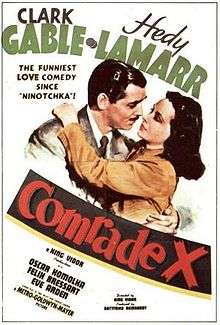Comrade X
| Comrade X | |
|---|---|
 1940 US Theatrical Poster | |
| Directed by | King Vidor |
| Produced by |
Gottfried Reinhardt King Vidor |
| Written by |
Walter Reisch (story) Ben Hecht Charles Lederer Herman J. Mankiewicz (uncredited) |
| Starring |
Clark Gable Hedy Lamarr Oskar Homolka Felix Bressart |
| Music by | Bronislau Kaper |
| Cinematography | Joseph Ruttenberg |
| Edited by | Harold F. Kress |
Production company | |
| Distributed by | Metro-Goldwyn-Mayer |
Release dates |
|
Running time | 90 minutes |
| Country | United States |
| Language | English |
| Budget | $920,000[1] |
| Box office | $2,079,000[1] |
Comrade X is a 1940 American comedy spy film directed by King Vidor and starring Clark Gable, Hedy Lamarr, and Oskar Homolka.
Plot
In the Soviet Union, American reporter McKinley "Mac" Thompson (Clark Gable) secretly writes unflattering stories, attributed to "Comrade X", for his newspaper. His identity is discovered by his valet, Vanya (Felix Bressart), who blackmails Mac into promising to get his daughter, a streetcar conductor named Theodore (Hedy Lamarr), out of the country. Theodore agrees to a sham marriage so she can spread the message of the benefits of Communism to the rest of the world. However, Commissar Vasiliev (Oscar Homolka) is determined to unmask and arrest Comrade X.
Cast
- Clark Gable as McKinley B. "Mac" Thompson
- Hedy Lamarr as Golubka / Theodore Yahupitz / Lizvanetchka "Lizzie"
- Oskar Homolka as Commissar Vasiliev
- Felix Bressart as Igor Yahupitz / Vanya
- Eve Arden as Jane Wilson
- Sig Rumann as Emil Von Hofer
- Natasha Lytess as Olga Milanava
- Vladimir Sokoloff as Michael Bastakoff
- Edgar Barrier as Rubick, Commissar's Aide
- Georges Renavent as Laszlo, world press attendee (credited as George Renevant)
- Mikhail Rasumny as arresting Russian Officer
Production
- Production on Comrade X began filming in late August 1940.
- The film was nominated for an Academy Award for Best Story.
Gable prophetically jokes that "Germany just invaded Russia" and "Panzer tanks are rolling into Ukraine" to get the Russian hotel manager to kick the German reporter out of his room. Less than a year after release, Germany did indeed invade Russia and the Ukrainian SSR.
This is one of the first prewar American films that openly criticized Nazi Germany. Most films dealing with Europe at the time either ignored the terrors of the totalitarian dictatorship, depicting Germany as "business as usual." This of course changed after the start of World War II in Europe, and more specifically, after the Fall of France. After Germany declared war on the USA, Hollywood became a major source of propaganda, depicting Nazis as cruel savages intent on world domination, from Hitler down to the common footsoldier.
Pre-war American films such as Comrade X and Ninotchka also depict the Soviet Union as backwards, dreary, and totalitarian. After entering the war on Russia's side, however, Hollywood's depictions of Russians immediately changed to brave, freedom-loving liberators, such as in Tender Comrade. Many of these war propaganda films resulted in the cast and production teams being called to testify before the House Un-American Activities Committee in the 1950s to determine the role of communism in Hollywood.
Box office
According to MGM records the film earned $1,520,000 in the US and Canada and $559,000 elsewhere resulting in a profit of $484,000.[1]
References
External links
| Wikimedia Commons has media related to Comrade X (film). |
- Comrade X at the American Film Institute Catalog
- Comrade X at the Internet Movie Database
- Comrade X at AllMovie
- Comrade X at the TCM Movie Database